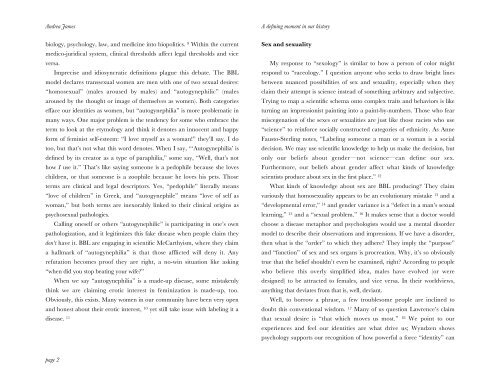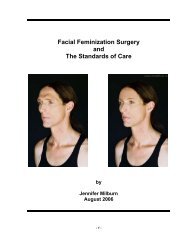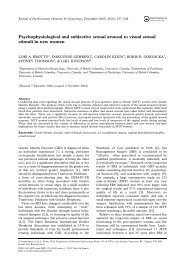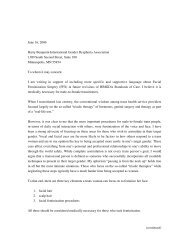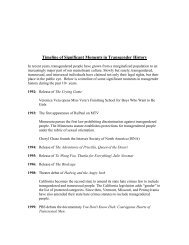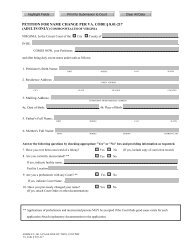A defining moment in our history - Transsexual Road Map
A defining moment in our history - Transsexual Road Map
A defining moment in our history - Transsexual Road Map
You also want an ePaper? Increase the reach of your titles
YUMPU automatically turns print PDFs into web optimized ePapers that Google loves.
Andrea JamesA <strong>def<strong>in</strong><strong>in</strong>g</strong> <strong>moment</strong> <strong>in</strong> <strong>our</strong> <strong>history</strong>biology, psychology, law, and medic<strong>in</strong>e <strong>in</strong>to biopolitics. 9 With<strong>in</strong> the currentmedico-juridical system, cl<strong>in</strong>ical thresholds affect legal thresholds and viceversa.Imprecise and idiosyncratic def<strong>in</strong>itions plague this debate. The BBLmodel declares transsexual women are men with one of two sexual desires:“homosexual” (males aroused by males) and “autogynephilic” (malesaroused by the thought or image of themselves as women). Both categoriesefface <strong>our</strong> identities as women, but “autogynephilia” is more problematic <strong>in</strong>many ways. One major problem is the tendency for some who embrace theterm to look at the etymology and th<strong>in</strong>k it denotes an <strong>in</strong>nocent and happyform of fem<strong>in</strong>ist self-esteem: “I love myself as a woman!” they’ll say. I dotoo, but that’s not what this word denotes. When I say, “‘Autogynephilia’ isdef<strong>in</strong>ed by its creator as a type of paraphilia,” some say, “Well, that’s nothow I use it.” That’s like say<strong>in</strong>g someone is a pedophile because she loveschildren, or that someone is a zoophile because he loves his pets. Thoseterms are cl<strong>in</strong>ical and legal descriptors. Yes, “pedophile” literally means“love of children” <strong>in</strong> Greek, and “autogynephile” means “love of self aswoman,” but both terms are <strong>in</strong>exorably l<strong>in</strong>ked to their cl<strong>in</strong>ical orig<strong>in</strong>s aspsychosexual pathologies.Call<strong>in</strong>g oneself or others “autogynephilic” is participat<strong>in</strong>g <strong>in</strong> one’s ownpathologization, and it legitimizes this fake disease when people claim theydon’t have it. BBL are engag<strong>in</strong>g <strong>in</strong> scientific McCarthyism, where they claima hallmark of “autogynephilia” is that those afflicted will deny it. Anyrefutation becomes proof they are right, a no-w<strong>in</strong> situation like ask<strong>in</strong>g“when did you stop beat<strong>in</strong>g y<strong>our</strong> wife?”When we say “autogynephilia” is a made-up disease, some mistakenlyth<strong>in</strong>k we are claim<strong>in</strong>g erotic <strong>in</strong>terest <strong>in</strong> fem<strong>in</strong>ization is made-up, too.Obviously, this exists. Many women <strong>in</strong> <strong>our</strong> community have been very openand honest about their erotic <strong>in</strong>terest, 10 yet still take issue with label<strong>in</strong>g it adisease. 11Sex and sexualityMy response to “sexology” is similar to how a person of color mightrespond to “raceology.” I question anyone who seeks to draw bright l<strong>in</strong>esbetween nuanced possibilities of sex and sexuality, especially when theyclaim their attempt is science <strong>in</strong>stead of someth<strong>in</strong>g arbitrary and subjective.Try<strong>in</strong>g to map a scientific schema onto complex traits and behaviors is liketurn<strong>in</strong>g an impressionist pa<strong>in</strong>t<strong>in</strong>g <strong>in</strong>to a pa<strong>in</strong>t-by-numbers. Those who fearmiscegenation of the sexes or sexualities are just like those racists who use“science” to re<strong>in</strong>force socially constructed categories of ethnicity. As AnneFausto-Sterl<strong>in</strong>g notes, “Label<strong>in</strong>g someone a man or a woman is a socialdecision. We may use scientific knowledge to help us make the decision, butonly <strong>our</strong> beliefs about gender—not science—can def<strong>in</strong>e <strong>our</strong> sex.Furthermore, <strong>our</strong> beliefs about gender affect what k<strong>in</strong>ds of knowledgescientists produce about sex <strong>in</strong> the first place.” 12What k<strong>in</strong>ds of knowledge about sex are BBL produc<strong>in</strong>g? They claimvariously that homosexuality appears to be an evolutionary mistake 13 and a“developmental error,” 14 and gender variance is a “defect <strong>in</strong> a man’s sexuallearn<strong>in</strong>g,” 15 and a “sexual problem.” 16 It makes sense that a doctor wouldchoose a disease metaphor and psychologists would use a mental disordermodel to describe their observations and impressions. If we have a disorder,then what is the “order” to which they adhere? They imply the “purpose”and “function” of sex and sex organs is procreation. Why, it’s so obviouslytrue that the belief shouldn’t even be exam<strong>in</strong>ed, right? Accord<strong>in</strong>g to peoplewho believe this overly simplified idea, males have evolved (or weredesigned) to be attracted to females, and vice versa. In their worldviews,anyth<strong>in</strong>g that deviates from that is, well, deviant.Well, to borrow a phrase, a few troublesome people are <strong>in</strong>cl<strong>in</strong>ed todoubt this conventional wisdom. 17 Many of us question Lawrence’s claimthat sexual desire is “that which moves us most.” 18 We po<strong>in</strong>t to <strong>our</strong>experiences and feel <strong>our</strong> identities are what drive us; Wyndzen showspsychology supports <strong>our</strong> recognition of how powerful a force “identity” canpage 2


